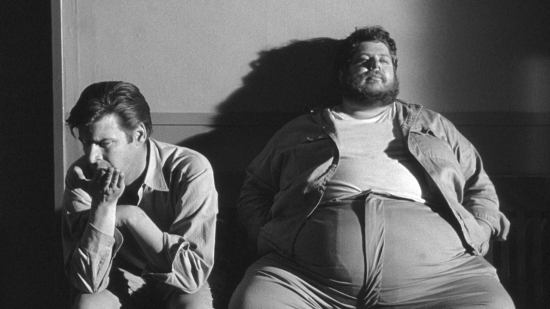
Samuel Fuller's 1963 film Shock
Corridor. What a mess. Kind of a fascinating mess, I
suppose. It's like going downtown and listening to one of the wide-eyed,
muttering homeless guys on a corner tell you about all the things he thinks are
really important. Though it would have to be an inordinately polite specimen.

Constance Towers plays
Cathy, a stripper who doesn't strip, who doesn't dance very well, and who says
she hates her job. The mystery over how she is employed at all is only one of
the Lake Erie sized plot holes in this movie.
She pretends to be her boyfriend's sister so he, Johnny (Peter Breck), can be committed
to an asylum when she tells the police about his violent incestuous urges. A
plan that actually works because apparently the police make no effort to ascertain
Cathy and Johnny's history or the two of them had a really elaborate set of
stories and fake IDs we never see.
Johnny wants to get committed so he can
interview the three inmates who witnessed a murder in the asylum kitchen.
Johnny's a journalist and he hopes to win the Pulitzer Prize for this.

All three of the witnesses turn out to be
mad for extremely topical reasons--one was brainwashed by Communists in North
Korea; one is a black man who was one of the first integrated students who,
cracking under pressure, became a white supremacist; one was a physicist who
worked on the atom bomb and had a breakdown. All three have moments of sanity preceded
by distorted colour documentary footage.

For a movie that doesn't seem like it gave
much thought to its plot--presumably in favour of message--it spends an awful
lot of time delivering exposition very awkwardly. We hear Johnny's thoughts in
voice-over. The first time is when he's apparently telling himself who his boss
and psychiatrist are and what they're doing as the scene opens.

I try to imagine Fuller directing Breck in
this scene: "Imagine you're telling yourself who these people are as
though you need to remind yourself."
The three witnesses also spend their moments
of sanity to give Johnny a synopsis of who they are and what made them crazy.
The guy who was brainwashed by Communists, who now usually thinks he's a Civil
War era Confederate General, tells Johnny his parents never taught him to love
the U.S. the way they ought to have and when he came in contact with an
American prisoner in Korea who told him patriotic stories it reversed his
brainwashing. Of course there's no explanation of how the brainwashing worked
to begin with. As in (the far superior) Pick Up On South Street, one has the
impression Fuller doesn't have a clear understanding of how Communism works in
theory or practice.

Oh, I have to mention the scene with the
"nymphos"--Johnny wanders into their room at one point and they hold
him to the ground, proceeding to tear his shirt and bite him like animals. Look
at the drawings on the walls:

The muscle man in tight shorts is
particularly intriguing. I don't think these nymphos ever heard of sex.

Johnny starts to lose his mind during all
this. He loses his ability to speak and refuses to let Cathy kiss him on the
mouth when she visits which she for some reason interprets as meaning he's
really starting to think she's his sister. I would have assumed he simply
wanted to avoid blowing his cover. I'm actually not sure if Cathy was confused
here or the movie was confused.
Johnny seems to go crazy for absolutely no
reason. The movie drops vague hints about how the atmosphere of the asylum made
him crazy. There's a director named Tim Hunter who writes in this Criterion
essay for Shock Corridor, "As the film
unfolds, though, the purity of the hero’s mission is undercut by his own
monomaniacal ego, and the delusions of omnipotence that mask the darkest
secrets of his soul. In Breck’s moving performance, Johnny becomes one of the
great doomed figures of modern day film noir—unwittingly pursuing a killer at
the expense of his own sanity." Well, he is there trying to win a Pulitzer,
but there's nothing else actually in the movie to support Hunter's
interpretation nor does he actually cite an example of a scene where we see
this cause and effect.
Shock Corridor has a 93%
rating on Rotten Tomatoes--though with only four "top critics", none
of whom I've heard of and none of their reviews are classified as rotten or
fresh. I really like Pick Up on South Street but, between
Shock Corridor and The Naked Kiss, I'm
starting to think Samuel Fuller may be a bit overrated.

No comments:
Post a Comment